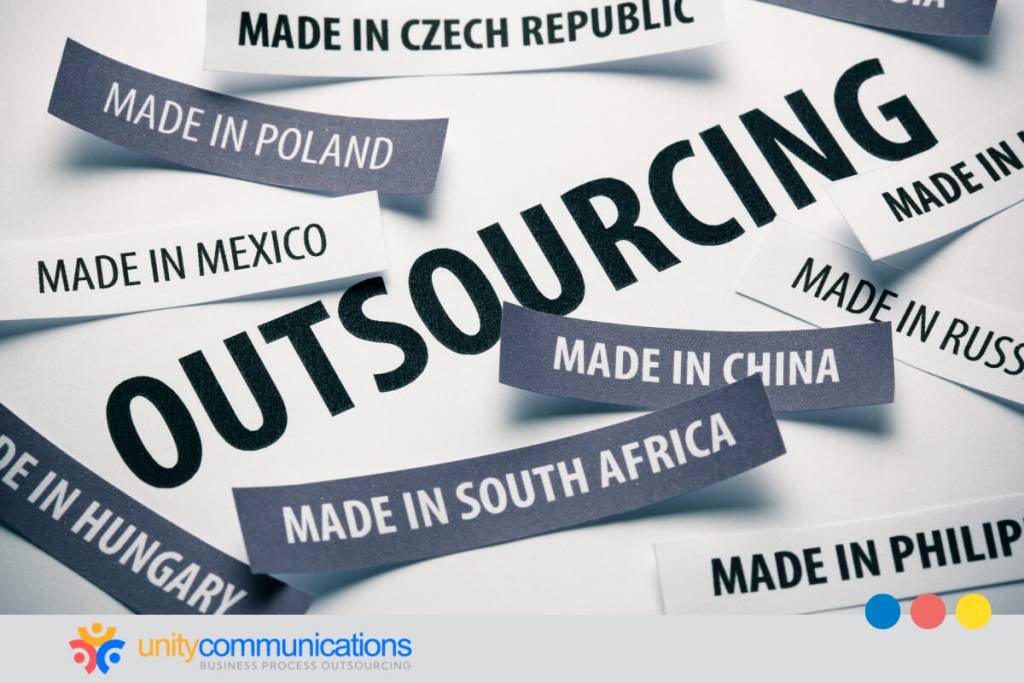IN THIS ARTICLE
Table of Contents
Outsourcing is not without problems. Although this strategy can save companies a lot of money, added stress and delays are inevitable due to time zone differences and cultural barriers.
Companies started partnering with remote workers much closer to home to address this. Companies in the U.S. can save money by working with external teams and virtual assistants in Mexico. The closer distance alleviates the common issues that come with outsourcing.
The possibilities and experience of this strategy are so different that a new term was coined for it—nearshore outsourcing. This article explores its advantages and disadvantages, with a focus on nearshoring in Mexico.
Advantages of Nearshore Outsourcing to Mexico

Nearshore outsourcing to Mexico is a financially efficient way to meet your outsourcing needs. The strategy has few up-front costs, and companies need not build new offices for an expanded team. Mexico is also right next to the U.S., which is an added benefit.
When outsourcing to Mexico, companies can hire virtual assistants or work with a back-office outsourcing company. Either way, they can reap the advantages of working with remote professionals who are easy to reach and close at hand. That said, nearshore outsourcing has advantages and disadvantages, so businesses must consider both before signing a contract.
Mexico is increasingly recognized as a top nearshore outsourcing destination. Its growing demand for nearshoring services is driven by factors like a resilient supply chain and favorable trade agreements. As detailed in our nearshore business process outsourcing guide, outsourcing to Mexico offers strategic benefits for long-term company growth and success.
Here are more compelling reasons to consider nearshore outsourcing to Mexico.
Close Proximity and Similar Time Zones
Geographical proximity and overlapping time zones are significant factors when comparing nearshoring versus offshoring. Nearshore outsourcing to Mexico is much easier than working with an external team in India or other offshore countries. Mexico’s time zones are compatible with the U.S., and the minimal time difference allows collaboration on both sides.
Mexico’s similar time zones with the United States offer a strategic advantage. For instance, Guadalajara and Mexico City are only an hour ahead of San Francisco, the information technology (IT) hub in the U.S. Tijuana and San Francisco also have no time difference.
The country’s proximity and time zones make real-time interactions and face-to-face meetings easier, enabling smoother remote work collaboration. Lastly, potential business trips are cheaper, faster, and more convenient since the U.S. is close to Mexico. An American client outsourcing to an offshore location in Asia may encounter a ten-hour time gap or more.
Cultural Similarity to the U.S.
Since Mexico is near the borders of the United States, Mexican professionals generally know American quality standards, workplace ethics, and deadline expectations. This familiarity allows them to build strong working relationships with the in-house team and prevent cultural misunderstandings or clashes.
Mexico and the U.S. also have similar cultures. They both believe in the value of education and teach the same subjects. Furthermore, Mexican and American cultures blend in some regions of the United States, making it easier for Mexican employees to understand or transition to American culture.
The nearshore outsourcing vendor may also have similar national holidays, which makes streamlining workflows and meeting deadlines easier for both parties.
Easy and Accessible Business Transactions
Mexico ranked 60th out of 190 companies in the Ease of Doing Business index, making it a top choice for companies looking for business process outsourcing (BPO) solutions. Many factors contribute to this, including:
- The United States-Mexico-Canada Agreement (USMCA) facilitates free trade and promotes foreign investment between the involved countries. It also safeguards intellectual property rights, making nearshore outsourcing to Mexico cost-effective and safe.
- Mexico also provides international companies with various incentives. These benefits include exemption from state or local income taxes on corporate earnings and additional grants from institutions such as the National Council of Science and Technology (CONACYT).
Mexico is also a member of the Pacific Alliance, the G20, and the Organization for Economic Co-operation and Development (OECD). Its active role in the global community adds to Mexico’s reputation and economic stability. These memberships also contribute to the nation’s overall business environment and show its commitment to international cooperation.
High-quality IT Infrastructure
Mexico has more than 20 tech parks with modern facilities, including Monterrey Technology Park, Apodaca Technology Park, Creative Digital City, and Guadalajara Software Center. These tech parks are in major IT powerhouses such as Mexico City, Monterrey, and Guadalajara, as well as emerging hubs such as Merida and Tijuana.
The government also incentivizes BPO and IT companies in the country to build innovative technologies, especially artificial intelligence (AI)-based solutions, to simplify outsourced processes.
Moreover, the Mexican government has allotted sizeable funds to refine the country’s tech infrastructure. As a result, the 5G mobile network was launched in 2021, accelerating digital operations and enhancing internet connectivity. Many other initiatives and programs back the nation’s IT ecosystem:
- The 500 LATAM startup program offers mentorship and funding to startups across different industries.
- The Fondo Nacional Emprendedor is a government-operated grant program that helps entrepreneurs focusing on the tech industry.
Large and Growing Pool of Skilled Talent
Finding people with the necessary skills is difficult when outsourcing IT or any type of work. However, you have a higher chance of landing the right candidate for the role if you have a large talent pool.
The Mexican government recently made educational and infrastructural improvements, which led to more people getting the tools and resources to expand their skills. The government also opened 120 tuition-free specialist technology universities to showcase its resolution to end the talent shortage.
Mexico is the second-biggest IT market in Latin America, with almost 225,000 skilled tech professionals. This fact makes Mexico an ideal destination for tech support outsourcing and software development outsourcing.
A 2022 report from Pentalog also ranked Mexico second worldwide for the best developers. Mexican software developers are experts in machine learning (ML), statistical programming, probability and statistics, data management, and data analysis. The country’s tech talent also has 79% proficiency in mobile app development and 93% in computer programming.
Professional Service Delivery
Mexican outsourcing firms and workers take service delivery seriously. The country excels in technical support, help desks, software development, and more complex services such as cybersecurity and ML. It is a go-to destination for outsourcing such services.
You can expect the same professionalism at home when nearshore outsourcing to Mexico.
As with any outsourcing partnership, you and your service provider must agree on deliverables, processes, and timelines. You must establish a clear workflow so projects stay on budget and schedule. You must also assign a point person for both parties to keep the lines of communication open and coordinate efforts.
Proven Nearshore Outsourcing Track Record
Mexico has over 350 BPO companies, making it a hotbed for nearshore outsourcing in Latin America. Global industry giants such as Apple, Google, Oracle, and Intel have a strong presence in the country. This indicates their trust in Mexico’s nearshore outsourcing capabilities.
One successful example of a BPO engagement is when Speck Products outsourced air freight and packaging to Mexico. Speck’s main concerns were ensuring their product’s quality and the packed item’s appearance. The company realized cost savings per unit in no more than eight weeks due to cheaper freight costs.
Lastly, Mexico’s role in offshore manufacturing outsourcing has strengthened its capabilities in managing outsourced activities.
Affordable Labor Costs
Mexico has significantly more affordable talent than the United States or Western Europe. For instance, an average software developer in the U.S. makes around $8,245 per year. In Mexico, the cost is only about $2,213.
Therefore, companies that outsource to Mexico can reduce their labor costs by over 70%. However, this is a rough estimate. Actual salaries will vary based on the software developer’s skills, experience, and location.
Furthermore, the cost of living in Mexico is 45.7% lower than in the U.S. Thus, workers can get by on $600 to $2,000 per month. Companies in the U.S. can offer remote workers in Mexico competitive salaries while still cutting their labor costs.
Disadvantages of Nearshore Outsourcing in Mexico

Although an excellent option for many companies in the U.S., nearshore outsourcing has advantages and disadvantages. Mexico is also not without flaws. However, you can alleviate the risks by following best practices for different BPO models.
Nearshore outsourcing in Mexico is like any other business strategy. To properly weigh the strategy’s advantages, here is a closer look at its disadvantages:
- Limited options. Nearshore outsourcing limits your company’s alternatives because the strategy involves excluding nations on the far side of the world in favor of service providers geographically near your country. It limits your options, which makes finding the right BPO partner for your needs more difficult.
- Political and economic stability. Coping with economic and political uncertainty is challenging. Your outsourced functions may be affected if the BPO company is located in an economically or politically unstable country. Interruptions may occur if the outsourcing location encounters an economic crisis or government policy changes.
- Quality concerns. Despite the cost savings brought by nearshore outsourcing, quality issues can arise. Your strategy may backfire if your chosen service provider does not have the same quality standards. It could negatively impact customer loyalty and retention.
- Legal and regulatory issues. Different laws and regulations can hamper your nearshore outsourcing strategies. For example, the data protection laws covering the provider may differ from the ones in your country. Unfamiliar policies can make it more difficult for BPO providers to meet your requirements.
How to Make the Most of Outsourcing

Now that you know the nearshore outsourcing advantages and disadvantages, let us explore how you can maximize the benefits of the strategy and minimize its risks.
Despite some disadvantages, companies still find nearshore outsourcing helpful in working more efficiently and saving money. Get the most out of nearshoring by considering successful examples of nearshore outsourcing and by following these best practices:
- Choose the right partner. The BPO firm you choose is one of the most crucial factors in ensuring the success of nearshore outsourcing. Select a provider with a skilled workforce and good business conditions. Make sure to conduct thorough research on potential outsourcing vendors before choosing.
- Create strong relationships. The success of your nearshore outsourcing strategy depends on building strong connections with your BPO partner. You must invest in your outsourcing provider by promoting open communication, aligning expectations and goals, and forging trust.
- Maintain quality control. Ensuring quality control is crucial when outsourcing business functions. Client companies must set clear quality standards. They should design a thorough quality control procedure to guarantee that rendered services and products meet the standards.
- Overcome cultural differences. Nearshore outsourcing requires careful management of cultural differences. Both parties should know each other’s business practices, organizational culture, and customs.
- Guarantee compliance. Compliance with relevant regulations and laws is vital when subcontracting business functions. You must ensure that your BPO provider follows all rules and regulations that apply to you. They should also implement extra security protocols to safeguard confidential information and intellectual property.
The Bottom Line
Nearshore outsourcing to Mexico has advantages and disadvantages. For the benefits, it offers a cost-effective solution and access to a talented workforce. However, you should be wary of the disadvantages such as quality issues, legal and regulatory concerns, and economic instability.
Unity Communications specializes in finding skilled talent in Mexico and connecting them to our clients in the United States. Let’s connect to find out how.





